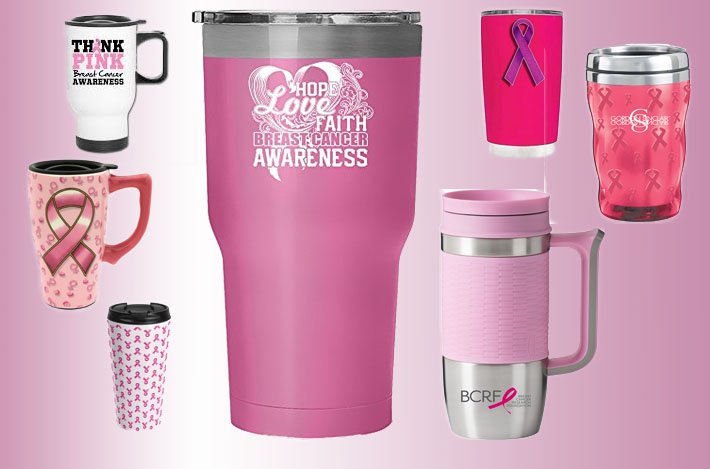Breast Cancer Awareness – Is It Working? Are There Any Real Point to Breast Cancer Awareness?
Breast cancer awareness programs are everywhere! One of them is pink travel coffee cup for breast cancer awareness.
Whilst governments and professional institutions run the ‘official’ programs, in any one country, there may also be many ‘non-official’ initiatives that are run by private individuals and groups. In fact, it seems that really anybody who wants to get involved can do so – whether they are qualified or not.
So what are the aims and objectives of these cancer awareness programs? What is it that these programs are actually trying to make us more aware of? Is it about the disease and its treatment? Is it to make sure that women know that they should present to the doctor immediately they find any problem in their breast or are they simply trying to increase the number of women attending the screening with Mammography – regardless of whether or not the motive for this might be purely financial?
Well, in reality, the only time a woman really wants to learn about breast cancer is when they, or someone close to them, actually develop it. But at that moment in time, they don’t need awareness – they just need solutions.
When a woman or man gets the disease they only need 3 things:
- Really good information about breast cancer and its treatment.
- A place to get their treatment.
- A supporting network of people around them to share their cancer journey.
One Middle Eastern country increased its attendance for breast screening from less than 20% to over 60% recently. How did they do this? It was quite simple actually; they told women that they would not have their national health card/entitlement renewed until they had their annual mammogram. But is it correct to essentially force women to have screening – even if it is in their best interests?
Actually, that particular country did have a breast cancer awareness program before the change in the law so at the very least this tells us that their breast cancer awareness program did not work. When it comes to screening uptake – i.e. the number of women attending for Mammography – then it is easy to measure the effectiveness of any awareness program.
But if the objective of the program is just general awareness and education, then it is fair to say that it would be very difficult, nigh on impossible probably, to accurately measure how successful any breast cancer awareness program is.
But surely, isn’t everyone aware of breast cancer and breast cancer screening? Are there really any places left in the world where women do not have sufficient awareness about this problem?
Well, the answer may not be what you would expect. There are still, sadly, many countries where there is simply an insufficient number of hospitals and specialized staff to treat the existing cases that arise. Certain countries in the Middle East and Africa for example, have totally inadequate resources in terms of breast surgeons, oncologists, radiologists, hospitals and so on, who are ‘breast specialized.’
So what does happen to the women who develop breast cancer in these poor and often very remote areas? Well, as hard as it may be to believe, the sad truth is that many of these cases simply go untreated. These poor women go home and die and no amount of awareness is going to change their situation.
Of the patients who do manage to get treatment, the treatment can be very poor – surgery but no adjuvant treatments (chemotherapy or radiotherapy), the wrong chemotherapy, surgery but no pathological examination or analysis of the specimen, which is simply thrown away; all these are real examples of the kind of things that go on in certain places.
In countries where there are no hospitals, no sanitation, no immunization and not even enough food, is there even any need for breast cancer awareness – probably not? So are we saying that breast cancer awareness programs are a feature of countries that have sufficiently developed cancer services, hospitals, and specialists – in other words, wealthy countries?
If we are, then surely we are talking about countries where women have access to education, the Internet and formalized medical services – so do they really even awareness programs? Surely they must already know that there is a disease called breast cancer and that if they get a problem then they should go and see a doctor? Aren’t they already doing this? Is there ANY evidence at all that women in these countries actually need awareness programs? Is there any evidence that without breast cancer awareness in these countries that women would not get treated?
The problem is that breast cancer awareness programs cost money – potentially lots of it. So if they are not actually doing any good – should we not be spending this money where it is more needed? And if awareness initiatives ARE really efficient and do a good job of educating the public about breast cancer, then surely once the public IS educated – there is no further use for the program that did the education in the first place?
So there remain some really important but unanswered questions about breast cancer awareness:
- How much do these programs actually cost?
- Are these programs effective?
- If awareness programs are effective – then when will they have been seen to have done their job and be stopped?
- Is there any point in having an awareness program in a country where there are inadequate medical services – could that money not be better spent elsewhere?
- What are the aims of the awareness program? This needs to be clearly defined.





